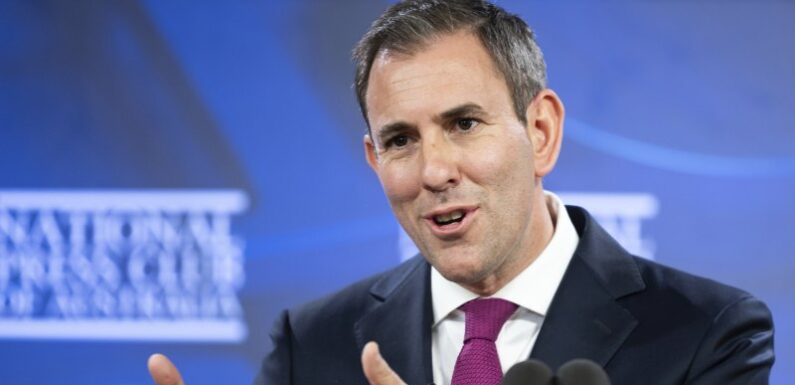
Save articles for later
Add articles to your saved list and come back to them any time.
One simple remark from Jim Chalmers on Thursday made it obvious he wants to act on his new, bleak forecast for the nation’s future by making some hard decisions.
But not just yet. The treasurer wants Australians to see the warnings about slower income growth in this week’s Intergenerational Report without causing an immediate furore over tax hikes or spending cuts.
Chalmers talked of the “pilot light of purpose” in politics and said that any leader who did not want to improve the future should be disqualified from the job.
Jim Chalmers at the release of the Intergenerational Report at the National Press Club in Canberra.Credit: Alex Ellinghausen
More earthily, he said he and his colleagues were working long days and “dragging our arses around airports” in the early hours of the morning because they wanted to create something better.
The logical conclusion is that this report, with its flood of forecasts about a tougher future, must lead to serious reform if Labor is to have any credibility on national leadership.
Chalmers took a swipe at the last government for doing too little but was extremely cautious about what he might do in time.
Asked about the forecast that Australians would have to pay more income tax because fuel excise and other revenue would fall away, he basically ruled out a major tax review or sweeping tax reform.
Asked about the warning that fewer people will be able to afford their own home, he avoided any hint that this would force changes to the age pension.
On the alarming cost of climate change in the new report, he pointed to existing policies without promising greater action to cut greenhouse gas emissions.
On the need for more and younger workers as the population ages, he hinted at new incentives to lift people from welfare to work in an employment white paper next month, but was vague about the new measures.
Chalmers leaned forward, however, on superannuation. He agreed, when asked, that many retirees were holding on to their super and passing it to their children when they could use it instead to live a better life.
“Ideally, before the end of the year, we will try and shape some policy development around retirement income products,” he said. This is code for making allocated pensions more attractive rather than using super for inheritances.
Chalmers made a strong argument for change in his speech to the National Press Club, although he was not prepared to spell out that change. This meant his speech was as smooth as an Irish cream when the country probably needs a brandy, served straight, to wake up to these challenges.
Climate. Tax. Housing. Education. The cost of huge spending programs like the National Disability Insurance Scheme. These are just some of the logical priorities now the Intergenerational Report is in full public view.
Labor can point to its net-zero emissions target and mammoth investment program to claim progress on climate, while it is doing more on housing under pressure from the Greens. Its education changes are likely to be big part of its second term agenda, if it gets that second term. On tax, however, it is staring at its feet when business leaders want it to raise its sights.
Chalmers sought to accentuate the positive, as Johnny Mercer sang with the Pied Pipers, but there was a sting in his message.
“We can own the future,” he said. “But only if we take the big shifts seriously.” He wants a debate on those shifts before he can build a consensus about hard decisions to lift growth.
It is utterly unacceptable, of course, for a political leader to issue a forecast for a smaller future without acting on that warning. The key promise from Chalmers is that the “pilot light of purpose” will take him and the government toward action. In time.
Cut through the noise of federal politics with news, views and expert analysis. Subscribers can sign up to our weekly Inside Politics newsletter here.
Most Viewed in Politics
From our partners
Source: Read Full Article
